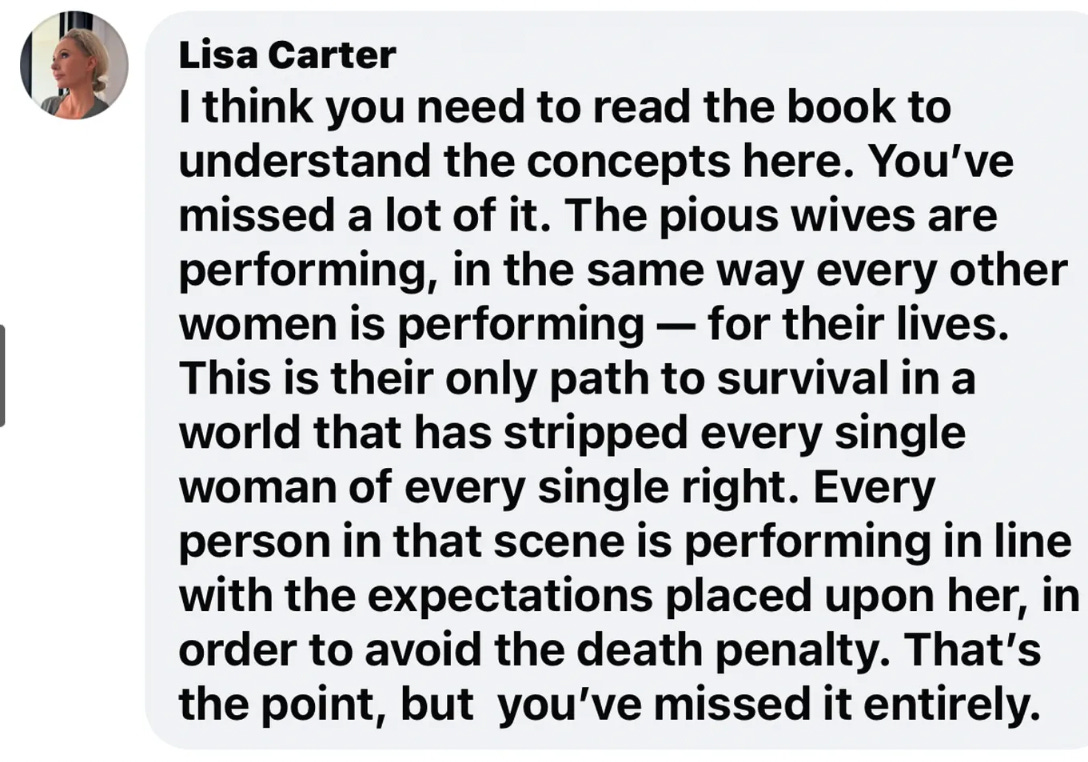The White Women in The Handmaid’s Tale Are Not “Victims,” They’re Patriarchy’s Middle Managers
They don’t just suffer under patriarchy. They enforce it for perks and power.
So I started watching The Handmaid’s Tale last week, and I’m up to episode three of this creepy-ass freak show. Naturally, I’ve been documenting my descent into this dystopian hell on social media.
Every time I write about the episodes, someone pops up in the comments to scold me:
“You need to read the book. The wives are performing for their lives! They’re victims too! You’re missing the point.”
The comment you see in the screenshot above is a classic example of apologetics for white women’s complicity in oppression, dressed up as “nuanced” literary analysis.
The woman who left this comment is basically saying: “You’re not understanding that the wives in The Handmaid’s Tale are victims too, they’re only acting the way they do to survive.” She frames all their cruelty as forced performance in a system they can’t control. .
I’ve seen these tactics before. She’s trying to shift the focus away from white women’s culpability by not examining how these women choose to enforce and maintain a violent system for their own relative power and safety. She also centers white womanhood as inherently victimized. This is a standard move. White women in these conversations often get cast as “just doing what they have to,” ignoring that other groups (including the Handmaids themselves, and the Marthas) also face death but don’t always become collaborators.
And ohhh, the condescension. “You need to read, Stacey.” “You don’t understand.” Using “you didn’t read the book” as an authority flex. As if critique is ignorance. As if disagreement is illiteracy and failure to comprehend. This is a form of gatekeeping that implies only certain interpretations are valid.
She also tries to flatten people’s survival strategies by pretending everyone in that world has only one path: obedience. But that’s false in both the book and real life. There are resistances, negotiations, alliances, betrayals. Plenty of moral choices that still exist, even under threat.
Bottom line is that Lisa up there is excusing these women’s participation in white supremacist patriarchy by redefining it as purely coerced. And comments like these are designed to make us feel sympathy for them or, at minimum, absolve them of agency
It’s predictable. Tiresome. And honestly? A perfect mirror of real life.
Because this isn’t just about Margaret Atwood’s dystopia. It’s about how white women respond to any critique of their role in systems of violence.
Yes, white women are oppressed under patriarchy. That is real. Their rights are policed. Their bodies are regulated. Their safety is conditional, always contingent on male approval.
But here’s the part too many refuse to face: oppression does NOT erase complicity.
In The Handmaid’s Tale, the wives aren't simply poor trembling victims forced into obedience at gunpoint. They are active architects of the system. They maintain the hierarchy that gives them status over Handmaids and Marthas. They enforce the rules. They orchestrate punishment. They get something out of other women’s suffering.
Yes, they’re “performing to survive,” but let’s talk about what survival looks like for them: maintaining power, control, and privilege by throwing other women to the wolves.
This ain’t unique to fiction.
White women have a long history of negotiating patriarchy by aligning with white men against women of color. Enslaver’s wives in the American South ran the plantation household and punished enslaved women for being raped. White women in segregation-era America demanded their “protection” while weaponizing false accusations against Black men. Contemporary white women voters routinely support politicians who attack reproductive rights, LGBTQ+ rights, and immigrant rights as long as their own social position is safe.
They’re not powerless. They’re choosing the kind of power patriarchy offers them: the power to dominate someone else.
Here’s what’s really happening when people defend the Wives: They’re invested in preserving the image of white women as innocent. Helpless. Morally pure. Because if we admit that even “oppressed” people can be enforcers of oppression, it complicates the comforting narrative that there are good guys and bad guys, victims and villains.
It also forces white women to ask hard questions about themselves:
When have I traded solidarity for safety?
When have I enforced the rules of patriarchy, racism, or classism to protect my own standing?
When have I been a Wife?
Survival is complex.
Yes, people make compromises under threat. But let’s not pretend everyone does it the same way. People negotiate poverty, dictatorship, and violence all over the world without becoming collaborators in cruelty. There are always choices. Always degrees.
When you insist the Wives had no choice, you’re not defending nuance. You’re defending denial.
Because the truth is messy. And if you see yourself in those Wives, maybe you should sit with that discomfort.
Not argue it away and tell me to read the book version as if nuance is synonymous with absolution.
If you appreciate this kind of unflinching analysis, I’d love to invite you to become a paid subscriber. Your support doesn’t just keep this writing going, it directly helps fund resources for my HBCU students. As a professor, I do more than teach; I help make sure my students have what they need to learn, grow, and thrive, even in these challenging times. Your subscription is an investment in the next generation of Black thinkers, journalists, and change-makers.




White women voting for Trump in a nutshell
“They are active architects of the system.” Yep. This is Serena through and through. Are they really gonna tell a woman, “Look, I know I held your wrists down while my husband raped you, but I was oppressed too.” 🙄 Gtfoh.